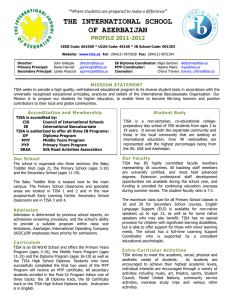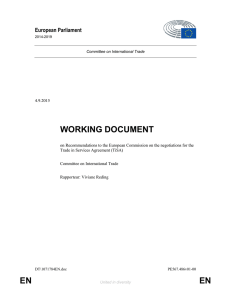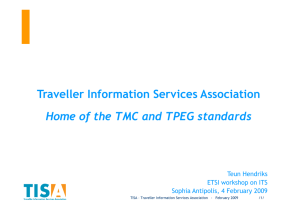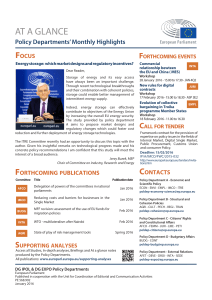The local and regional dimension of the Trade in Services
advertisement
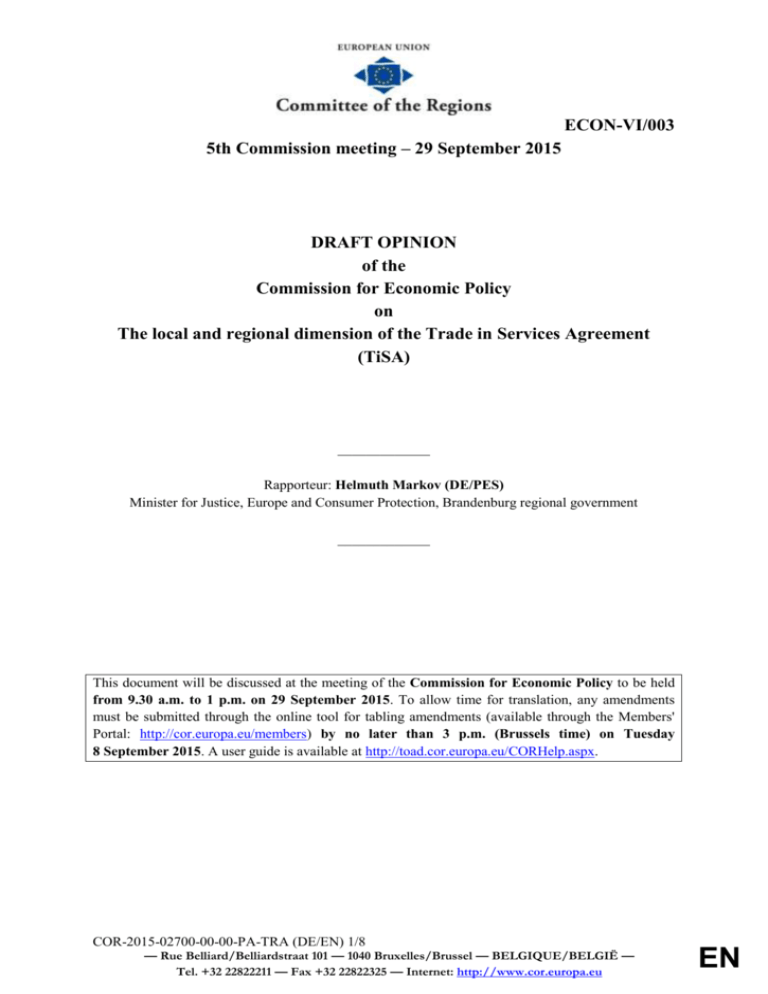
ECON-VI/003 5th Commission meeting – 29 September 2015 DRAFT OPINION of the Commission for Economic Policy on The local and regional dimension of the Trade in Services Agreement (TiSA) _____________ Rapporteur: Helmuth Markov (DE/PES) Minister for Justice, Europe and Consumer Protection, Brandenburg regional government _____________ This document will be discussed at the meeting of the Commission for Economic Policy to be held from 9.30 a.m. to 1 p.m. on 29 September 2015. To allow time for translation, any amendments must be submitted through the online tool for tabling amendments (available through the Members' Portal: http://cor.europa.eu/members) by no later than 3 p.m. (Brussels time) on Tuesday 8 September 2015. A user guide is available at http://toad.cor.europa.eu/CORHelp.aspx. COR-2015-02700-00-00-PA-TRA (DE/EN) 1/8 — Rue Belliard/Belliardstraat 101 — 1040 Bruxelles/Brussel — BELGIQUE/BELGIË — Tel. +32 22822211 — Fax +32 22822325 — Internet: http://www.cor.europa.eu EN Reference document / COR-2015-02700-00-00-PA-TRA (DE/EN) 2/8 Draft Opinion of the Commission for Economic Policy – The local and regional dimension of the Trade in Services Agreement (TiSA) I. POLICY RECOMMENDATIONS THE EUROPEAN COMMITTEE OF THE REGIONS PRELIMINARY REMARKS 1. The Trade in Services Agreement (TiSA) is a trade agreement which has been under negotiation since early 2013, currently between 52 members of the World Trade Organisation (WTO)1, including the EU. 2. The aim of the negotiating parties is to liberalise trade in services, since services are an important sector in the global economy. Some 68% of manpower in the EU is employed in the services sector, with 10 million EU jobs dependent on exports of services. Liberalisation of trade in services is understood primarily to mean removing barriers to the provision of services by foreign suppliers. 3. Although the TiSA negotiations are taking place outside the framework of the WTO, the agreement is intended to be compatible with the General Agreement on Trade in Services (GATS) so that it can be integrated into a multilateral agreement if other WTO members join at a later date. GENERAL COMMENTS 4. In its opinion of 3 July 2003 on the GATS negotiations in the WTO, the Committee of the Regions (CoR) already noted that the negotiations on trade in services were important in view of regional economic concerns (helping local businesses to access markets outside the EU) and the interests of local and regional authorities (LRAs), which are often responsible for delivering services. In that opinion the Committee also expressed the view that it was not feasible to apply the principle of reciprocal market access for companies run by municipalities or regional authorities owing to their embeddedness in their own locality. 5. The same considerations obtain for the TiSA negotiations, together with the observation that the basis of public service provision is LRAs' sense of their obligations and duties towards the citizen and that therefore democratic supervision, continuity, accessibility and quality must be ensured. 1 WTO members currently taking part in the TiSA negotiations include Australia, Chile, Costa Rica, Hong Kong, Iceland, Israel, Japan, Canada, Colombia, Liechtenstein, Mauritius, Mexico, New Zealand, Norway, Pakistan, Panama, Paraguay, Peru, Switzerland, South Korea, Taiwan, Turkey, Uruguay the United States, and the 28 EU Member States. COR-2015-02700-00-00-PA-TRA (DE/EN) 3/8 GENERAL RECOMMENDATIONS THE EUROPEAN COMMITTEE OF THE REGIONS 6. recognises that services are an important sector in the global economy, as well as Europe's economy, and that efficiency gains primarily in the private sector are likely to result from further liberalisation of trade in services through the TiSA; 7. welcomes the current discussion about the TiSA and emphasises the importance of striking a balance between the parties' need for confidentiality during the negotiations and the general need for transparency, in order to ensure that legitimate outcomes can be achieved with the involvement of all stakeholders; 8. welcomes the European Commission's efforts to improve the transparency of the negotiations, but nevertheless notes that although the European Commission has made the negotiating mandate publicly accessible, local and regional authorities – represented at EU level by the European Committee of the Regions – must be invited to take part in the European Commission's discussions at the beginning and end of the negotiating rounds; 9. endorses the provision made in the European Commission's Directives for negotiating the agreement that: "The agreement shall confirm the right of the EU and its Member States to regulate and to introduce new regulations on the supply of services within their territories in order to meet public policy objectives"; 10. affirms the relevance of referring in the negotiating Directives to Protocol No 26 on Services of General Interest and calls for the autonomy of local and regional levels of government to be fully respected in accordance with Article 4(2) of the Treaty on European Union (TEU); regrets to note, however, that the terminology concerning public services used in the different trade agreements currently being negotiated by the EU (CETA, TTIP and TiSA) is not consistent. 11. emphasises that under Article 345 of the Treaty on the Functioning of the European Union (TFEU), no trade agreement concluded by the EU may provide for the privatisation of public services, and also that public authorities may ask private companies, including companies in which they hold shares, to provide services of general interest; 12. emphasises the need to collect comprehensive and comparable data on the effects of the TiSA's provisions at local and regional level, and the need to update accordingly statistical reports and economic forecasts based on these data and impact assessments; 13. is concerned that the Sustainability Impact Assessment provided for in the EU's negotiating directives2 has not yet been finalised; 2 See point 10 in: http://data.consilium.europa.eu/doc/document/ST-6891-2013-ADD-1-DCL-1/en/pdf COR-2015-02700-00-00-PA-TRA (DE/EN) 4/8 14. draws attention to the obligation under Article 11 TFEU to integrate environmental protection requirements into EU external trade policy, in particular with a view to promoting sustainable development; 15. as the EU body representing local and regional authorities, calls for LRAs to be included as appropriate in the internal EU decision-making process: LRAs are the players that bear most responsibility for public services, and they must be consulted to properly assess the costs as well as the advantages and disadvantages of liberalisation. The European Commission's attention must be drawn to the particular interests of the local and regional level in relation to the TiSA negotiations. This role could be significantly strengthened if the opinion of the Court of Justice of the European Union (CJEU) on the free trade agreement between the EU and Singapore were to confirm that the TiSA has the characteristics of a mixed trade agreement, which in a number of Member States must be ratified by the assemblies representing the regional level; 16. points out that under Article 3(1) TFEU the common commercial policy constitutes an integral part of the Union's exclusive competences. However, where trade negotiations have implications for the Member States' competences the division of competences in those negotiations must also be clarified at an early stage with reference to the subsidiarity principle; PROPOSALS 17. recommends that services of general interest within the meaning of the European Commission's Green Paper on Services of General Interest, including services of general economic interest, be explicitly excluded from the agreement on trade in services. LRAs must be able to provide services of public interest at any time. Further, instead of a "negative list" of spheres excluded from the agreement, the CoR would like to see a "positive list" of policy areas to be covered by the TiSA. This is important because the general positive list could be used to clarify further which policy areas would be affected by the agreement; 18. would expect that data-friendly strategies, even if they are essential for businesses and for growth, be used only in so far as they do not violate citizens' right to appropriate privacy protection (i.e. comprehensive, unconditional protection of personal data); 19. opposes any encroachment on the sovereignty of national governments and LRAs, especially in the spheres of education, culture, theatre, libraries, museums and finance, as well as labour protection, environmental protection, data protection, licensing of healthcare facilities and laboratories, waste management facilities and power stations, consumer standards, standards relating to social cohesion, schools and publicly-financed education services, and other, privately-financed education services, as well as public procurement provisions; 20. opposes restrictions to cross-subsidisation of undertakings under the same local authority where they exceed the restrictions existing under EU and national law; 21. would like to see a revision clause included in the agreement, so that decisions on liberalisation of a service can be reversed at any time; COR-2015-02700-00-00-PA-TRA (DE/EN) 5/8 22. is opposed to the inclusion of clauses that oblige authorities to fix the degree of liberalisation achieved at the time of the agreement (standstill clause), that prohibit a liberalised service from being returned to the public sector (ratchet clause), and that make any new service subject to automatic and complete liberalisation (safeguard clause); 23. urges that standards in force in the EU not be lowered for the sake of the TiSA: it must also be possible to improve standards after conclusion of the agreement; 24. calls for a social chapter to be included in the TiSA laying down social protection standards, in particular labour standards, based on the relevant ILO conventions; 25. calls for the country of destination principle to be upheld where standards differ, including especially Mode 4 services (temporary free movement of service suppliers), to ensure that rules on qualifications and on labour and collective bargaining laws continue to apply in the host country; the temporary free movement of service suppliers must on no account be used to prevent strikes or circumvent existing collective bargaining laws (by hiring temporary workers); 26. trusts that regulatory cooperation will not be allowed to undermine democratic legislation or regulations at any level or to hamper the legislative process; 27. insists that the TiSA should include the option of judicial review with regard to respect for human rights in the context of trade in services; 28. calls for legal disputes affecting compliance with this agreement to be referred to the public courts at the place of the defendant's registered office, and for proceedings to be conducted in the defendant's language and governed by the laws in force in the defendant's country; the right of appeal must be safeguarded; 29. urges that the agreement include provisions for online consumer protection, with particular reference to fraudulent business operations, as well as a special jurisdiction regime for consumer transactions and easier access to information on international roaming charges; 30. expects the universal service principle to be safeguarded, so that for instance people living in remote regions, islands or mountainous areas enjoy the same standard of service and do not pay more than people living in urban areas; 31. opposes the classification of municipal and regional provisions on land use and regional development or land-use plans as non-tariff barriers to trade; 32. welcomes the explicit exclusion of audiovisual services from the negotiations, but regrets that this does not also apply to cultural services; is consequently concerned that it is difficult to distinguish cultural services and calls for protection of local linguistic and cultural diversity, paying particular attention to the interests of minorities, as well as copyright and intellectual property; COR-2015-02700-00-00-PA-TRA (DE/EN) 6/8 33. disagrees with necessity tests and the inclusion of vague legal concepts such as "unnecessary" and "inappropriate"; 34. is categorically opposed to commitments relating to financial services that would conflict with existing EU measures to regulate financial markets and products, as well as "transparency requirements" whereby countries would have to inform and take note of comments from TiSA signatories and private stakeholders in advance of planned financial regulation; 35. urges that a second public hearing be held on the Trade in Services Agreement and expressly calls on the European Commission to take into account the findings of this hearing and of the previous consultation in its concluding assessment of the provisions set out in the agreement; 36. calls for the TiSA negotiations to be conducted in an open manner so as to include developing countries and least developed countries; 37. points to the need for a multilateral approach in a world that is becoming more interconnected; 38. calls for trade rules to be negotiated that contribute both to making trade fairer and more equitable, and to sustainable development. Brussels, … COR-2015-02700-00-00-PA-TRA (DE/EN) 7/8 II. PROCEDURE Title Reference(s) Legal basis Procedural basis Date of Commission letter Date of Bureau decision Commission responsible Rapporteur Analysis Discussed in commission Date adopted by commission Result of the commission vote Date adopted in plenary Previous Committee opinion Consultation of Subsidiarity Monitoring Network The local and regional dimension of the Trade in Services Agreement (TiSA) / Article 307(4) Rule 41(b)(ii) RoP / 15 April 2015 Commission for Economic Policy Helmuth Markov (DE/PES) 26 May 2015 29 September 2015 Opinion on The Transatlantic Trade and Investment Partnership (TTIP) – COR-2014-05385-00-00-AC Opinion on The impact on local and regional authorities of the negotiations on the General Agreement on Trade in Services (GATS) at the WTO – CdR103-2003_fin_ac / _______________ COR-2015-02700-00-00-PA-TRA (DE/EN) 8/8





